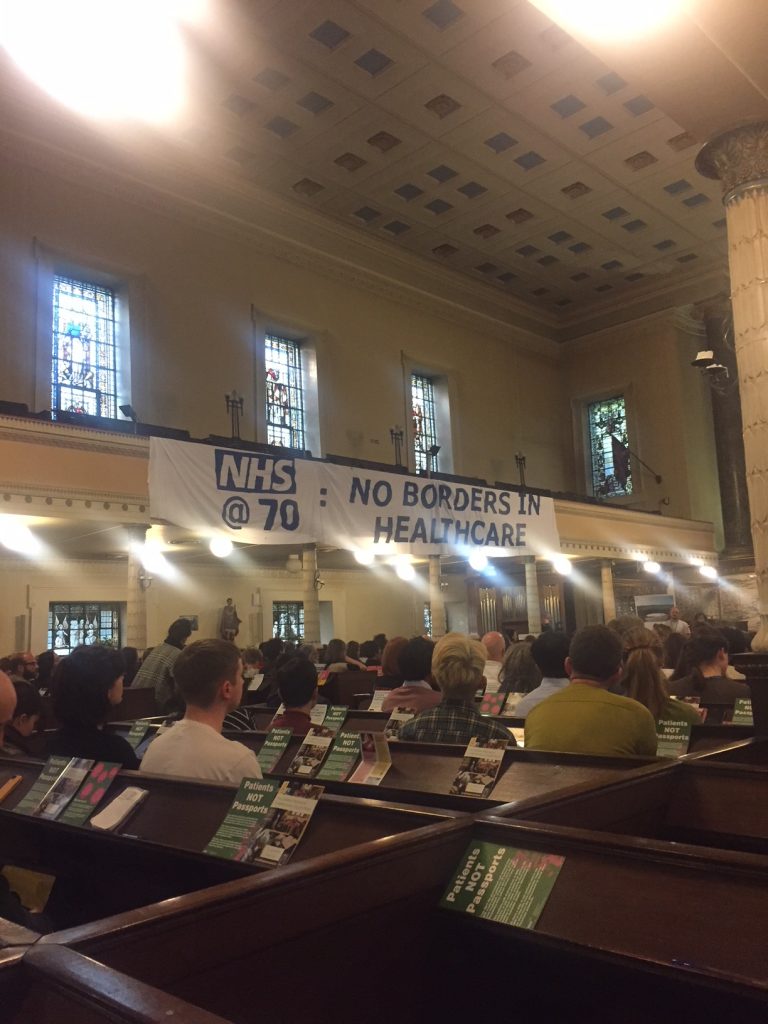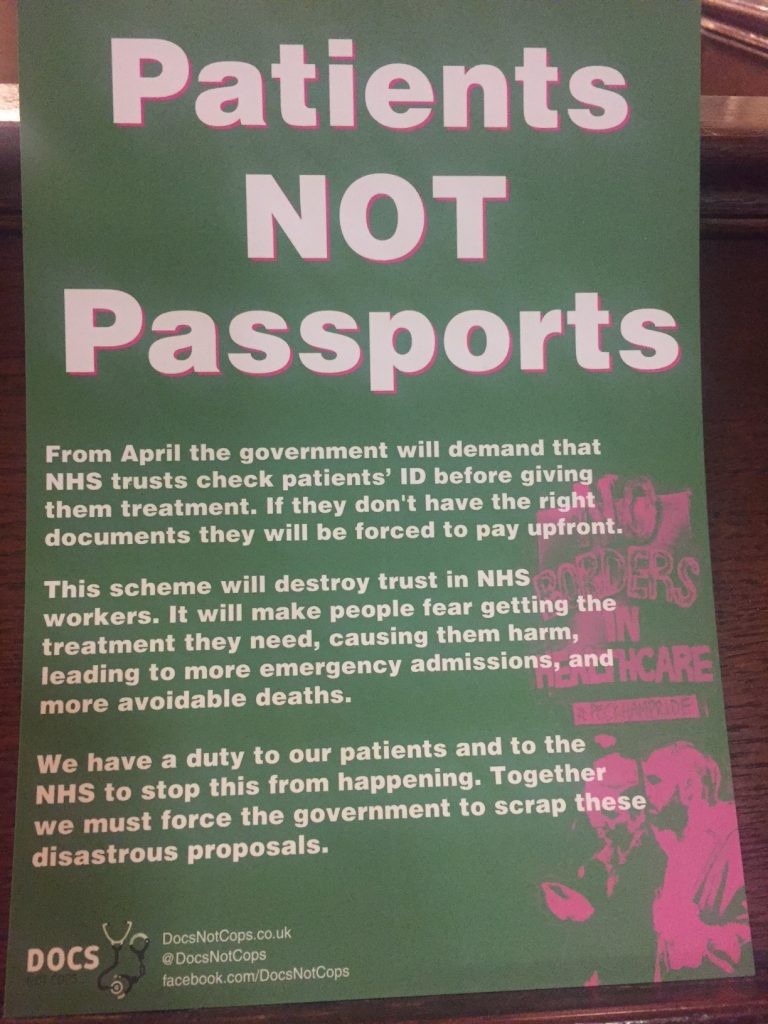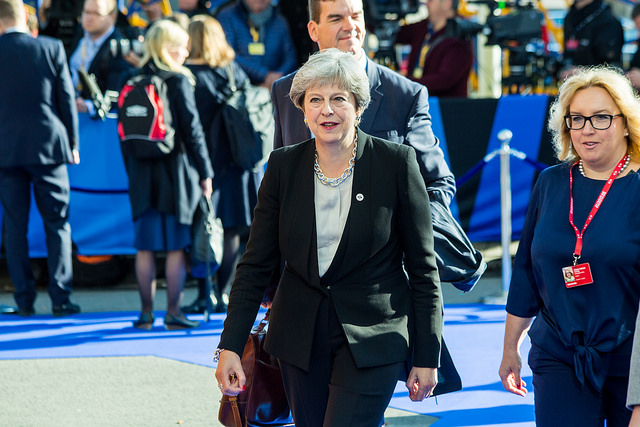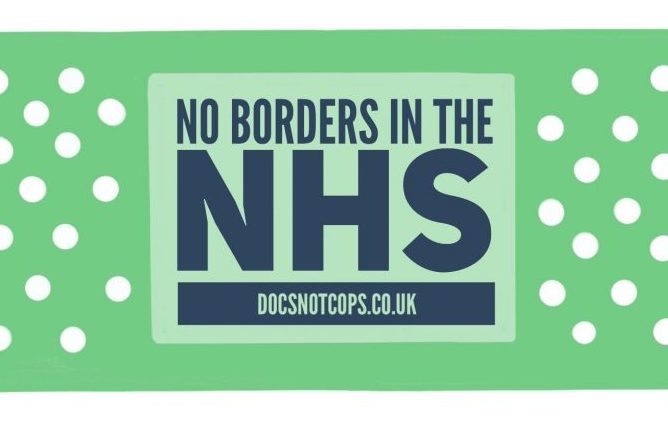Healthcare workers and allies are leading the way against NHS charges on migrants by launching a new toolkit initiative to build community opposition to the Government’s hostile environment policies around the UK.
‘Patients Not Passports’ is an online resource designed to support individuals to advocate for people who face towering advanced payments ahead of accessing NHS care, and to end immigration checks on those suspected of being “overseas visitors”.
Speaking at the launch in London on Tuesday, Colenzo Jarrett Thorpe, the National Officer for Health for Unite, said: “Our NHS was built on immigration. People came from all over the world to build our NHS. It would not have been possible.
“We must resist these pernicious laws that promote the hostile environment policies. We must be part of the large scale opposition that can beat these attacks on migrants and asylum seekers.”
Putting An End to NHS charging
We’re being asked to accept that treating people this way is normal, and that people dying in silence and anonymously is normal.
Junior doctor, Sophie Williamson
Sophie Williamson, a junior doctor and an advocate for Docs Not Cops, added: “I didn’t train to be a doctor to check people’s passports.”
“We’re being asked to accept that treating people this way is normal, and that people dying in silence and anonymously is normal,” she continued.
“We all have a responsibility to stop this charging.

Image credit: Patients Not Passports launch/RightsInfo
“We will stop the Government using health workers for border control, bring an end to NHS charging and an end to the demand for IDs and passports ahead of treatment.
“We will continue to fight until all racism and all borders are removed from the NHS.”
Why Is A ‘Patients Not Passports’ Toolkit Needed?
The aim of the toolkit is to aid the building of a grassroots movement of individuals who believe that healthcare in the UK should be free at the point of access for all – and encourage local groups to lobby their NHS trusts to oppose discriminatory policies.
Charging occurs in secondary care, including hospitals and community services provided by both NHS and non-NHS funded providers.

Image credit: Launch information/Rights Info
NHS Trusts are now required to question everyone’s eligibility for care upfront – a demand which groups such as Medact, Docs Not Cops and Migrants Organise say undermines the patient-healthcare provider relationship from the start.
Until recently, NHS Digital systematically shared patient data with the Home Office for immigration enforcement purposes. This agreement was suspended in May 2018 – but patient information continues to be shared with the Home Office through other means, including as a result of patient debt accumulated because of charging.
“These policies not only deter people from seeking help when they are unwell but also compromise the quality of the care provided, damaging the health and well-being of patients in need,” information from the Patients Not Passport website reads.
Why Were Advanced Charges For Medical Treatment Brought In By The Government?
The Government says the charges were expanded following the passing of the Immigration Act 2014 to plug a funding gap in the NHS to pay for undocumented migrants who need medical attention.
However, its own data shows that deliberate ‘health tourism’ accounts for only 0.3% of the NHS budget.
“This is a high price to pay for the erosion of the principles of the NHS and putting thousands of patients’ lives at risk,” Patients Not Passports states.
The charges metered out fit in with the hostile environment policies undertaken by the Conservative Government in 2012 when now Prime Minister Theresa May was the Home Secretary.

Image credit: Theresa May/ Flickr
‘Hostile environment’ is the name given to a set of administrative and legislative measures designed to make staying in the UK as difficult as possible for people who do not have a leave to remain – and to force them to leave voluntarily.
As a result, many migrants and families struggle to access the rights set out by the European Convention on Human Rights – and ratified in UK law under the Human Rights Act 1998.
At the launch event, anti-racism activist Amrit Wilson spoke about when the hostile environment policies first began to take root in Britain, giving a history of “the monster” from colonialism to present day.
“What the British state has always wanted is cheap labour without upkeep,” she said.
“The phrase, ‘We are here because you were there’, is about colonialism. But it applies to migrants too. They are here because of imperialism in their countries and because the wars that have been fought in their countries.”
Who Has A Right To Healthcare In The UK?
Access to healthcare is a universal human right.
The right to health doesn’t mean you’re guaranteed free healthcare, but it is the right to the highest attainable standard of health. This means states must give equal access to the right to health for all of us. The right to health applies to everyone, regardless of their immigration status.
In practice, this means that the State must have measures in place to ensure medical services and medical attention are given to everyone in the event of ill health. People who travel to the UK for whatever reason have just as much right to use National Health Services if they need to than any home citizen.
This includes individuals who have travelled to Britain to seek asylum.







